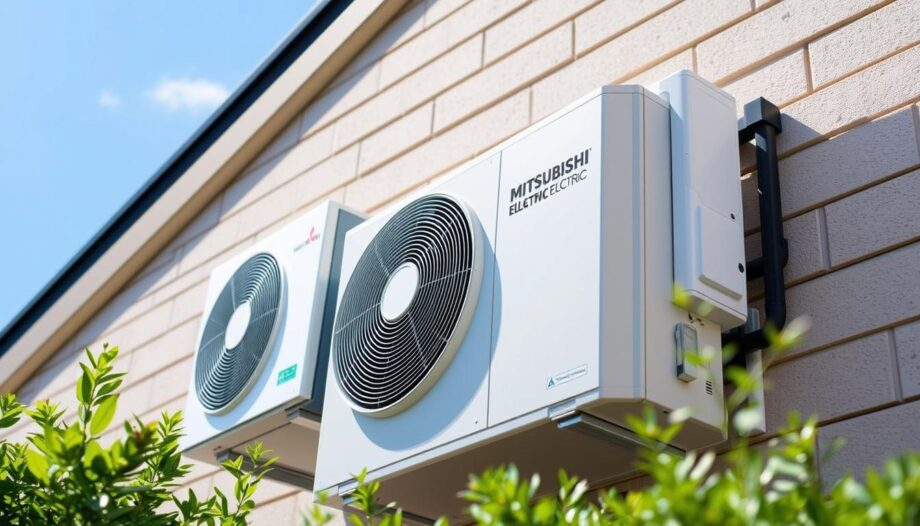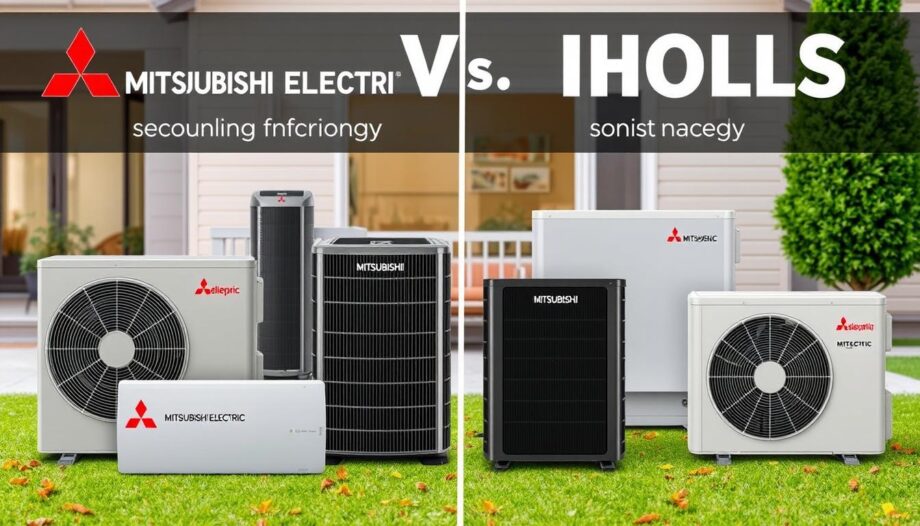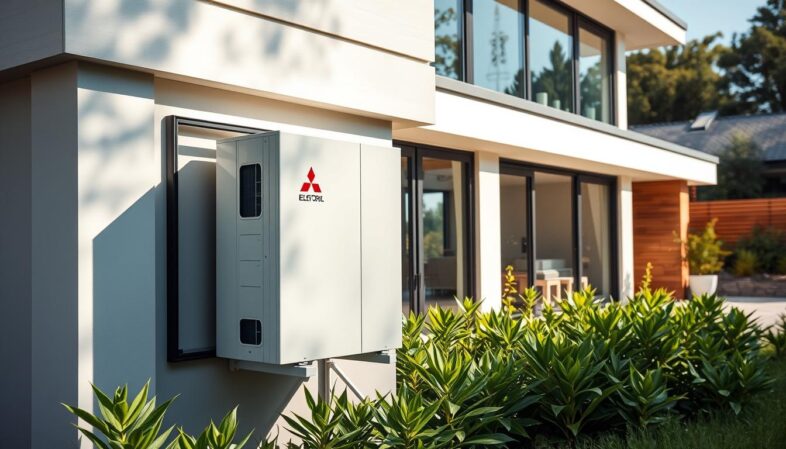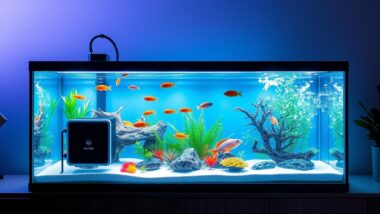Mitsubishi Electric Heat Pumps Review: Did you know Mitsubishi Electric heat pumps can heat your home still at a cost capacity down to 5º F outside and continue to heat at a lower efficiency even below zero? With the Energy Efficient Home Improvement (25C) Tax Credit many US property owners, can get 30% back on the cost of installation. This can be up to $2,000 off your taxes. Mitsubishi Electric is a top name in heating and cooling, offering efficient heat pump solutions.
Renewable heating with Mitsubishi heat pumps can cut your energy use in half, says the U.S. Department of Energy. People have saved $1,000 to $2,000 a year by switching to electric heat pumps. These systems work well in cold and warm weather, heating your home even in sub-zero temperatures.
Looking for Mitsubishi heat pumps? You'll find their Hyper Heat mini splits can heat down to -13 F at reduced capacity and -5 F at 100% capacity. Standard mini splits can handle temperatures as low as ~0 F without shutting off. But they get less efficient below 32 F. Mitsubishi offers many indoor unit types, including wall-mounted, ceiling cassettes, and more. This means you can heat and cool different zones in your home.
Read on and learn the following:
- Mitsubishi Electric heat pumps provide 100% heating capacity down to 5º F
- Homeowners can claim 30% of installation costs for an all-electric heat pump, up to a $2,000 tax credit
- Renewable heating with Mitsubishi heat pumps can reduce energy usage by half
- Customers have reported savings between $1,000 to $2,000 in yearly energy costs
- Mitsubishi offers various indoor unit options for flexible zone heating and cooling
Introduction to Mitsubishi Electric Heat Pumps
Mitsubishi Electric heat pumps are a top pick for those wanting energy-saving heating and cooling. Since 1968, Mitsubishi has been a leader in air source heat pump technology. Their products suit most climates and home sizes, making them versatile.
Mitsubishi's heat pumps stand out for working well in very cold temperatures. They can handle -15°C with reduced efficiency and even -30°C. This is thanks to the Hyper-Heating INVERTER (H2i) technology, which boosts performance in cold weather.
These heat pumps are not just efficient but also eco-friendly. Switching to a Mitsubishi heat pump can cut your carbon footprint by up to 44%. They also save you up to 50% on energy bills each year, since they don't need gas or oil.
Thinking about buying a Mitsubishi Electric heat pump? Remember the cost includes both the unit and installation. Prices vary from £3,000 to £6,000 for single zone systems. For multiple zones, expect to pay £7,500 to over £20,000. Yet, the long-term savings and environmental benefits often justify the cost.
How Mitsubishi Electric Heat Pumps Work
Mitsubishi Electric heat pumps are a smart way to heat and cool your home. They move heat between inside and outside units. This makes your home comfy all year, using less energy than old heating methods. Let's explore how they work.
Heating and Cooling Capabilities
Mitsubishi Electric heat pumps do both heating and cooling. In winter, they pull heat from outside and bring it in. This warms your home. In summer, they take heat out of your home and send it outside, keeping it cool inside.

Mitsubishi Electric has many heat pump models for different needs and budgets. The Ecodan series is known for its energy efficiency, even in cold weather. The Zubadan series can heat up to -13°F (-25°C), great for cold areas.
Inverter Technology for Efficiency
Mitsubishi Electric heat pumps use special inverter technology. Unlike old systems, these heat pumps adjust their power as needed. This means better temperature control, more energy savings, and less wear on parts.
These heat pumps keep your home comfy by always adjusting to your needs. They use less energy, which means lower bills and less harm to the environment. Choosing Mitsubishi Electric heat pumps is good for your wallet and the planet.
Benefits of Installing a Mitsubishi Electric Heat Pump
Getting a Mitsubishi Electric heat pump is a smart move for your home. It saves energy, cuts costs, and is quiet. These heat pumps keep your home comfy, use less energy, and lower carbon emissions. You'll save on bills and get tax credits for energy-efficient upgrades.
Energy Efficiency and Cost Savings
Mitsubishi Electric heat pumps are top-notch in energy efficiency. They have high SEER and HSPF ratings, meaning lower bills. Their inverter technology uses just the right amount of energy, making them even more efficient.
Ductless Mitsubishi air conditioners beat traditional systems in energy use. They save energy by avoiding ductwork losses. Massachusetts residents can get up to $10,000 in rebates for installing these systems through Mass Save and Kearney HVAC.
Quiet Operation
Mitsubishi Electric heat pumps are super quiet. Ductless mini splits are as quiet as 19dB, quieter than most. This means a peaceful home without loud heating and cooling.
Versatility in Installation Options
Mitsubishi Electric heat pumps are easy to install. Ductless systems can be set up in just one day. They need only a small hole, fitting many homes and rooms.
These systems can power up to 11 indoor units. This lets you control different zones for better comfort and energy use.
Mitsubishi Electric Heat Pump Models
Mitsubishi Electric has a wide range of heat pumps for different needs and budgets. Whether you need top efficiency, reliable performance in cold, or a budget-friendly option, Mitsubishi has you covered.
Ecodan Series
The Ecodan series is known for its high efficiency and reliable performance. Prices in the UK range from £3,575 to £5,815. These heat pumps have SEER ratings up to 33.1 and HSPF ratings up to 13.5, saving a lot of energy compared to traditional heating.
Zubadan Series

The Zubadan series works well in very cold climates. It can keep 100% efficiency at -15 °C and works at -30 °C too. It's a great choice for those who need a heat pump that can handle harsh winters.
Standard Heat Pump Models
For milder climates, Mitsubishi's standard heat pumps are efficient and affordable. Prices range from £3,000 to £6,000 for single-zone systems. Multi-zone systems cost between £7,500 and £20,000. Despite being cheaper, they still have high efficiency, with SEER ratings over 18.
When comparing Mitsubishi's standard and hyper heat models, there are some key differences:
| Model | Heat Capacity at 47 °F | Heat Capacity at 17 °F | Heat Capacity at 5 °F | Heat Capacity at -13 °F |
|---|---|---|---|---|
| MXZ-3C30NA4 (Standard) | 36,000 BTU | 21,000 BTU | 19,800 BTU | N/A |
| MXZ-3C30NAHZ4 (Hyper Heat) | 36,000 BTU | 28,600 BTU | 28,600 BTU | 26,400 BTU |
The choice between a standard or hyper heat Mitsubishi heat pump depends on your climate, temperature, backup heating, and budget. All Mitsubishi heat pumps are quiet, with most making about 50 decibels of noise.
Mitsubishi Electric Heat Pumps review
Mitsubishi Electric heat pumps are a top pick for many homeowners. They are known for their quality, long warranty, and great reputation. Let's explore what makes them stand out.
Efficiency is key, and Mitsubishi Electric delivers. A homeowner saw big energy savings and comfort boosts by switching to a Mitsubishi system. This system had a SEER rating of 20.2, much higher than their old Trane.
Mitsubishi Electric has heat pumps for all needs and budgets. The cost for ducted units can be between $7,500 and $13,000. In one case, the cost was $11,500. Plus, they often get tax credits, like the $2k for high-efficiency systems.
| Model | Heating Capacity at 47°F (BTU) | Heating Capacity at 5°F (BTU) | Sound Pressure Level (dB) | Recommended Breaker Size (AMPS) | SEER | EER | HSPF | COP at 47°F | COP at 5°F | Price |
|---|---|---|---|---|---|---|---|---|---|---|
| Standard 24,000 BTU | 30,600 | 19,000 | 54 (cooling) / 58 (heating) | 25 | 19.0 | 10.6 | 10.0 | 3.9 | 1.87 | $2,918 |
| Hyper Heat 24,000 BTU | 30,600 | 21,600 | 54 (cooling) / 58 (heating) | 40 | 18.0 | 12.5 | 10.0 | 4.0 | 1.95 | $3,797 |
Mitsubishi Electric's Hyper Heat technology is amazing. Their heat pumps work well in very cold temperatures. They can handle -13°F at 90% capacity and -5°F at 100% capacity.
These heat pumps are also very quiet. Homeowners love how quiet they are. They also heat evenly, thanks to their ability to modulate and run longer cycles.
Compared to other brands, Mitsubishi Electric offers the latest tech at a good price. While they might cost more upfront, the savings and better performance make them a smart choice.
Comparing Mitsubishi Electric Heat Pumps to Other Brands
When looking for a heat pump for your home, it's key to compare different brands. Mitsubishi Electric heat pumps are known for their high efficiency, reliability, and long life. Let's explore how Mitsubishi Electric compares to other top brands.

Efficiency Ratings
Mitsubishi Electric heat pumps are very energy-efficient. Many of their models have SEER ratings of 20 or more. For example, they offer a cooling efficiency of 23.1 SEER and a heating efficiency of 12.5 HSPF.
LG ductless heat pumps are about five to seven percent less efficient than Mitsubishi's. Trane also does well, with many models having SEER ratings over 18. But Mitsubishi Electric's slightly higher cost is balanced by their energy-saving tech, leading to big savings over time.
Reliability and Longevity
Choosing a heat pump means picking one that will last. Mitsubishi Electric and Daikin offer 12-year warranties for compressors and parts. Mitsubishi provides a 10-year parts and a 12-year compressor warranty, the longest among brands, showing their confidence in their products.
Trane's warranties vary but usually offer 10 years on internal parts for registered products. While LG has the lowest upfront price for ductless heat pumps, Mitsubishi Electric's long life and reliability make them a better choice in the long run.
| Brand | SEER Rating | Warranty | Noise Level |
|---|---|---|---|
| Mitsubishi Electric | Up to 23.1 | 12 years | 34 dB |
| LG | 5-7% lower than Mitsubishi | – | – |
| Daikin | – | 12 years | – |
| Trane | Up to 18+ | 10 years | – |
Mitsubishi Electric heat pumps also have a maximum indoor noise level of 34 dB, quieter than other brands. They include a catechin pre-filter in their air quality features, offering extra protection against allergens.
Cost-wise, Mitsubishi Electric heat pump systems cost between £3,000 and £8,000, depending on size and features. Trane systems cost between £2,500 and £7,500. Although Mitsubishi Electric might cost more upfront, their energy-saving tech and long-term reliability make them a wise choice for homeowners seeking lasting value and comfort.
Factors Affecting the Cost of Mitsubishi Electric Heat Pumps
Thinking about a Mitsubishi Electric heat pump for your home? It's key to know what affects the cost. The price changes based on the model, size, and how it's installed.
Size and Capacity of the Unit
The size and power of the heat pump matter a lot. Mitsubishi has many models for different home sizes and needs. Bigger homes or those needing more energy will cost more.
Here's a look at prices for different sizes:
| Heat Pump Size (Tons) | Price Range |
|---|---|
| 2 to 3 tons | £3,800 – £6,600 |
| 4 to 5 tons | Up to £9,000 |
The number of zones in your home also affects the price:
| Number of Zones | Price Range |
|---|---|
| Single-zone | £4,000 – £7,000 |
| Multi-zone | £8,000 – £20,000 |
Installation Complexity
The installation's complexity is another big factor. Things like the site's accessibility, ductwork needs, and system type can raise costs.
Installers charge £75 to £150 an hour. This can be 30 to 40 percent of the total cost. Installation prices range from £1,500 to £20,000, depending on the job's complexity and the model.
In short, the cost of a Mitsubishi Electric heat pump depends on size, zones, and installation complexity. Knowing these factors helps find the right heat pump for your home and budget. Working with a skilled HVAC pro is key.
Rebates and Incentives for Installing Mitsubishi Electric Heat Pumps
Looking into rebates and incentives is key when you're thinking about installing a heat pump. Mitsubishi Electric heat pumps are not just efficient and high-performing. They also offer big savings through government programs and tax credits.
The Inflation Reduction Act gives a tax credit of up to 30% of the project cost. This can be up to $2,000 for products installed between January 1, 2023, and December 31, 2032. This credit is part of a $3,200 limit for energy efficiency tax credits. These credits have specific limits for different home improvements.
To get the tax credit, heat pumps must meet certain efficiency standards. These standards depend on the location and type of heat pump. Homeowners can use the credit for upgrades to their primary residence. Spreading improvements over time and combining different upgrades can help maximise the credit.
The Mitsubishi Electric Hyper-Heating H2i system is very efficient. It can work down to -13°F, perfect for cold areas. It has SEER2 ratings up to 20 and HSPF2 ratings up to 10. This means it's very efficient for both cooling in summer and heating in winter.
Combining federal tax credits and rebates from state or utility programs can save homeowners up to $10,000.
The cost of the Mitsubishi Hyper-Heating H2i system varies. It's between $8,000 and $20,000, depending on the size and complexity. Ductless systems cost between $8,000 and $12,000. Ducted systems cost between $12,000 and $20,000. Homeowners can get up to $2,000 in federal tax credits and up to $8,000 in rebates through programs like HEEHRA.
| Incentive | Amount | Details |
|---|---|---|
| Federal Tax Credit | Up to $2,000 | 30% of project cost, part of $3,200 annual limit |
| HEEHRA Rebate | Up to $8,000 | Rebate for installing high-efficiency systems |
| Total Potential Savings | Up to $10,000 | Combining federal tax credits and state/utility rebates |
By using these rebates and incentives, you can lower the cost of installing a Mitsubishi Electric heat pump. This makes it a more affordable and appealing choice for your home's heating and cooling needs.
Maintaining and Troubleshooting Your Mitsubishi Electric Heat Pump
To keep your Mitsubishi Electric heat pump working well, regular maintenance is key. It's important to tackle any problems quickly. This way, your heat pump will last longer, work better, and be more reliable.
Regular Maintenance Tasks
Looking after your Mitsubishi Electric heat pump is vital. Here are some important tasks to remember:
- Clean or replace air filters every 1-3 months, depending on how much you use it and your surroundings.
- Check the refrigerant levels and fix any leaks fast to keep it cooling and heating right.
- Make sure the outdoor unit is clean of leaves or dirt to keep air flowing well.
- Get a professional to check it over at least once a year to catch any problems early.
By doing these maintenance tasks regularly, your Mitsubishi Electric heat pump will work its best. This means fewer breakdowns and more comfort in your home.
Common Issues and Solutions
Even with good care, your Mitsubishi Electric heat pump might still have problems. Here are some common issues and how to fix them:
| Issue | Possible Cause | Solution |
|---|---|---|
| Reduced airflow | Dirty air filters or blocked vents | Clean or replace filters and ensure vents are unobstructed |
| Unusual noises | Loose components or refrigerant issues | Schedule professional inspection and repair |
| Inconsistent heating/cooling | Incorrect thermostat settings or refrigerant leaks | Check thermostat settings and have a professional assess refrigerant levels |
| Ice formation on outdoor unit | Low refrigerant levels or faulty defrost cycle | Contact a professional for diagnosis and repair |
If you're having trouble with your heat pump or don't know how to fix it, get help from a skilled HVAC technician. They can find the problem and fix it, keeping your Mitsubishi Electric heat pump in top shape.
Regular heat pump maintenance not only ensures optimal performance but also helps extend the life of your system, saving you money in the long run.
By being proactive with maintenance and fixing problems quickly, you can enjoy your Mitsubishi Electric heat pump for many years.
Conclusion
Choosing a Mitsubishi Electric heat pump is a smart move for those wanting to save energy and money. These systems use advanced technology to keep your home comfortable all year. The Hyper Heat series, for example, works well even in very cold temperatures.
Mitsubishi Electric and Daikin are both known for their energy-saving and reliable heat pumps. But Mitsubishi Electric stands out for its focus on green heating solutions. By picking a Mitsubishi Electric heat pump, you help the planet and save on energy costs.
While Mitsubishi Electric heat pumps might cost more upfront, they save you money in the long run. Plus, you could get rebates or incentives. Make sure to get regular maintenance and proper installation to get the most out of your investment.
In summary, Mitsubishi Electric heat pumps are a great choice for those looking to save energy and money. They offer a blend of efficiency, performance, and eco-friendliness. By choosing these systems, you can make your home more comfortable, sustainable, and cost-effective for years to come.
FAQ
How efficient are Mitsubishi Electric heat pumps compared to traditional heating systems?
Can Mitsubishi Electric heat pumps provide both heating and cooling?
Are Mitsubishi Electric heat pumps suitable for cold climates?
How much does a Mitsubishi Electric heat pump cost?
Are there any rebates or incentives available for installing a Mitsubishi Electric heat pump?
How long do Mitsubishi Electric heat pumps typically last?
Are Mitsubishi Electric heat pumps noisy?
What maintenance is required for a Mitsubishi Electric heat pump?
Can I install a Mitsubishi Electric heat pump myself?
How do I find a qualified installer for my Mitsubishi Electric heat pump?
Source Links
- 7 Reasons for Switching to a Modern Heat Pump | Mitsubishi Electric HVAC US – https://www.mitsubishicomfort.com/articles/switching-to-modern-heat-pump
- Mitsubishi Hyper Heat vs. Mitsubishi Standard Heat Pump: Which One Sho – https://gotductless.com/blogs/mitsubishi-mini-splits/mitsubishi-hyper-heat-vs-mitsubishi-standard-heat-pump-which-should-i-choose?srsltid=AfmBOopG7h5CweVIbZujDgfk3cN_3JWAGBCHf0RE3tpQjWK8V6sc8Qa6
- Homeowners Insights: Candid Mitsubishi Heat Pump Reviews – NH's Top Choice for Home Comfort | Sanford Temperature Control – https://choosesanford.com/mitsubishi-heat-pump-reviews/
- 2024 Mitsubishi Heat Pump Review & Buying Guide – https://www.furnaceprices.ca/heat-pumps/mitsubishi-review/
- Mitsubishi Hyper Heat Mini Split Reviews – Superior CO-OP HVAC – https://scoophvac.com/mitsubishi-hyper-heat-mini-split-reviews/
- Heat Pumps in Extreme Cold Climates | Mitsubishi Electric HVAC US – https://www.mitsubishicomfort.com/articles/mythbusters-heat-pumps-for-extreme-cold-climates
- Are Mitsubishi Heat Pumps the Best? – Adirondack Heat Pumps – https://hyperheatpump.com/are-mitsubishi-heat-pumps-the-best/
- Mitsubishi Electric Heat Pumps Review – https://www.energysage.com/heat-pumps/best-heat-pumps/mitsubishi-electric-heat-pump-review/
- Efficiency Redefined: Discover the Benefits of Mitsubishi Electric Heat Pumps – NH's Top Choice for Home Comfort | Sanford Temperature Control – https://choosesanford.com/mitsubishi-electric-heat-pumps/
- Advantages of Mitsubishi Electric Heat Pumps | Kearney HVAC | MA/NH – https://www.kearneyhvac.com/blog/advantages-mitsubishi-electric-heat-pumps/
- 5 Reasons to Use a Ductless Mitsubishi Air Conditioner – KCR, Inc. – https://www.callkcr.com/5-reasons-to-use-a-ductless-mitsubishi-air-conditioner/
- Mitsubishi Hyper Heat vs. Mitsubishi Standard Heat Pump: Which One Sho – https://gotductless.com/blogs/mitsubishi-mini-splits/mitsubishi-hyper-heat-vs-mitsubishi-standard-heat-pump-which-should-i-choose?srsltid=AfmBOoo66OxeeC2SllyrdFkbnUYDmUlNLFU4SBG7exgt-w7AN0146zMH
- Trane vs Mitsubishi Heat Pump – https://emergencyacinc.com/blog/trane-vs-mitsubishi-heat-pump
- Mitsubishi ducted heat pump systems – https://www.bogleheads.org/forum/viewtopic.php?t=389809
- Mitsubishi Hyper Heat vs. Mitsubishi Standard Heat Pump: Which One Sho – https://gotductless.com/blogs/mitsubishi-mini-splits/mitsubishi-hyper-heat-vs-mitsubishi-standard-heat-pump-which-should-i-choose?srsltid=AfmBOool-k9OjoQc-MKXSf4eY9NIJBvvwc1LACkmuY1U0MyPDSa93sIb
- Mitsubishi vs. Daikin vs. Fujitsu vs. LG – Compare Ductless Heat Pump Brands │GreenSavers — Home energy contractor in Portland and Bend, Oregon. Install insulation, HVAC, and windows. – https://greensavers.com/articles/why-mitsubishi-ductless-heat-pump
- The Hidden Investment: Exploring Mitsubishi Heat Pump Cost – NH's Top Choice for Home Comfort | Sanford Temperature Control – https://choosesanford.com/mitsubishi-heat-pump-cost/
- How much does it cost to use Mitsubishi Hyper Heating? – https://www.scoophvac.com/2024/07/17/how-much-does-it-cost-to-use-mitsubishi-hyper-heating/
- Mitsubishi Hyper Heat vs. Mitsubishi Standard Heat Pump: Which One Sho – https://gotductless.com/blogs/mitsubishi-mini-splits/mitsubishi-hyper-heat-vs-mitsubishi-standard-heat-pump-which-should-i-choose?srsltid=AfmBOooOsx_2IqWPtGsMNzisS00g6MIk966GdDgRtRfP7mGSBZvxG_R1
- Air Source Heat Pumps Tax Credit – https://www.energystar.gov/about/federal-tax-credits/air-source-heat-pumps
- Reviewing the Mitsubishi Electric Hyper-Heating H2i Series – https://www.aeheatingandcooling.com/blog/review-mitsubishi-electric-hyper-heating-h2i-series
- How to Optimize the Energy Efficiency of Mitsubishi Heat Pumps – GreenBuildingAdvisor – https://www.greenbuildingadvisor.com/question/was-my-system-designed-right
- Pros and Cons of Using Mitsubishi Heat Pumps for Air Conditioning – https://hyperheatpump.com/pros-and-cons-of-using-mitsubishi-heat-pumps-for-air-conditioning-in-upstate-new-york/
- Mitsubishi Hyper Heat vs. Mitsubishi Standard Heat Pump: Which One Sho – https://gotductless.com/blogs/mitsubishi-mini-splits/mitsubishi-hyper-heat-vs-mitsubishi-standard-heat-pump-which-should-i-choose?srsltid=AfmBOorrWwD6UOrWnT4KZhr_Zm6TyY_-7BHJF8woNmVvjrnt03BAiu_2
- Why Fall is the Perfect Time to Upgrade to a Mitsubishi Electric Heating and Air Conditioning System – https://www.ecicomfort.com/blog/why-fall-is-the-perfect-time-to-upgrade-to-a-mitsubishi-electric-heating-and-air-conditioning-system
- Daikin v/s Mitsubishi Heat Pump Installation Process: What’s the difference – https://halkettelectrical.co.nz/post/daikin-v-s-mitsubishi-heat-pump-installation-process-whats-the-difference




